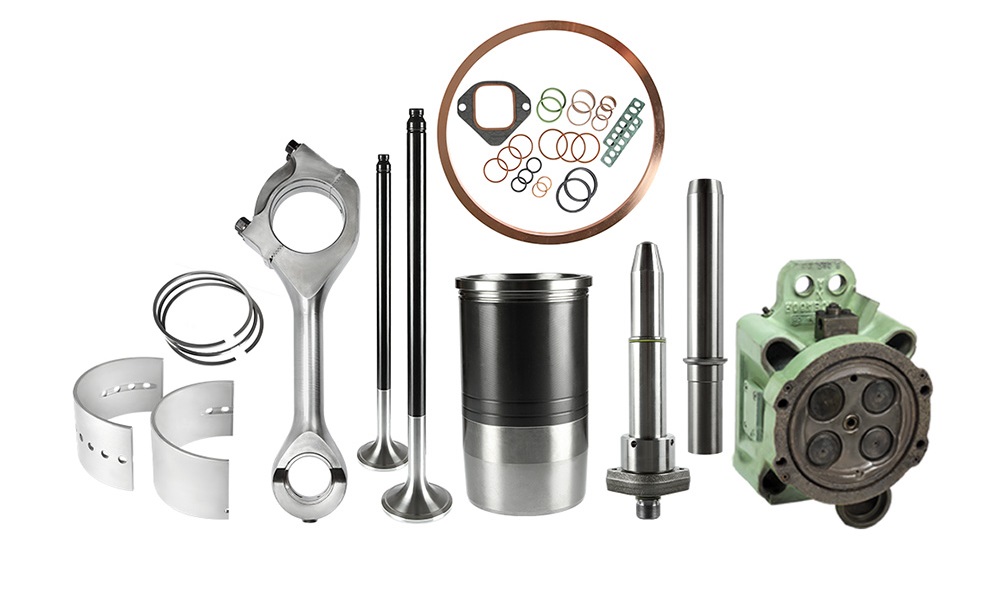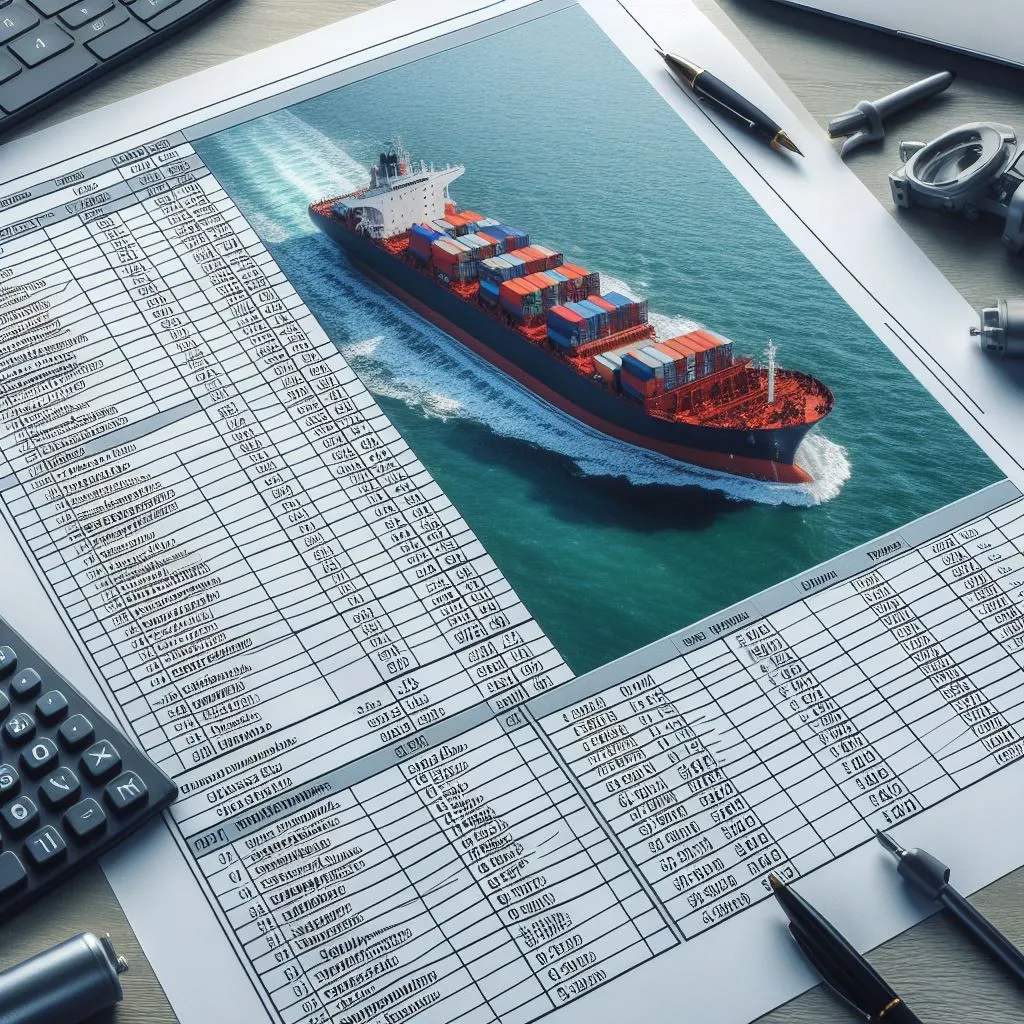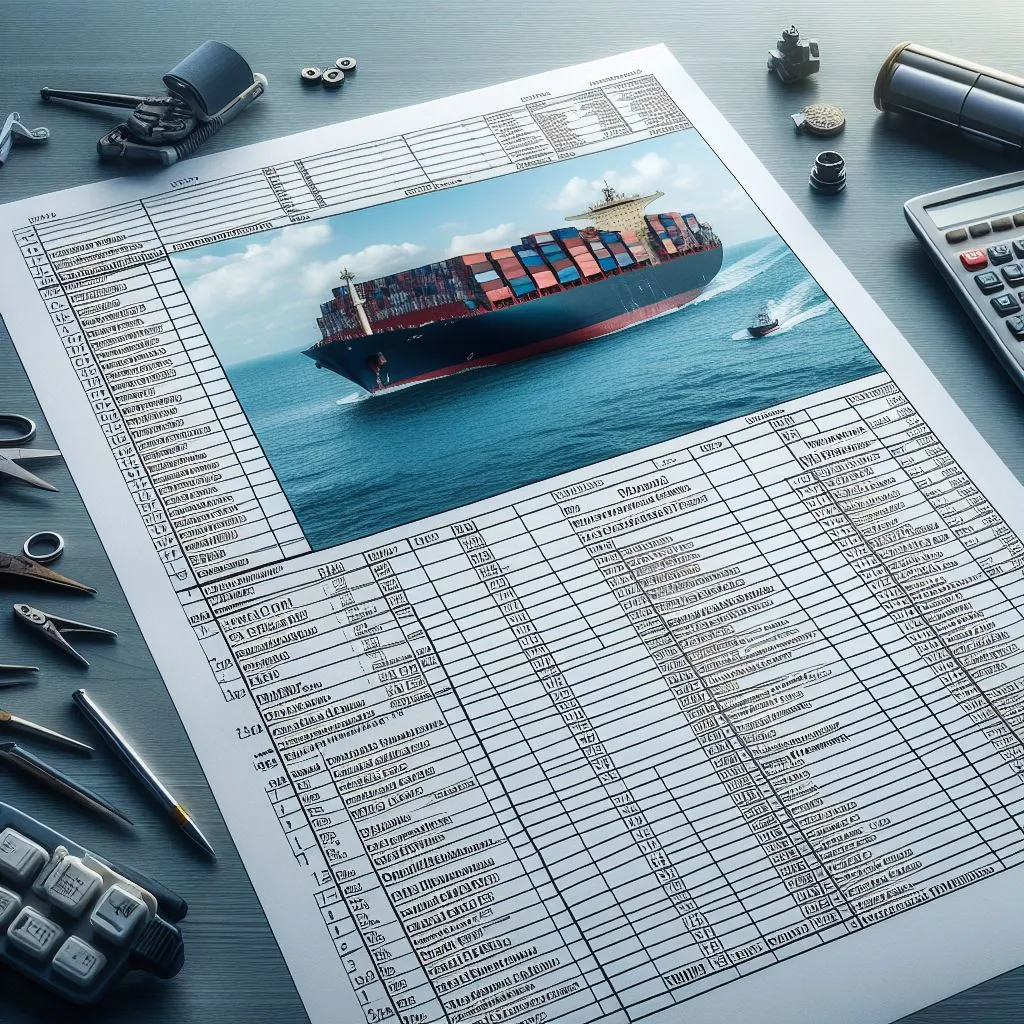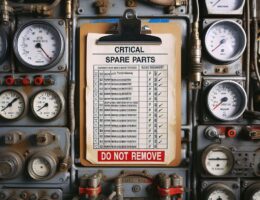-
Table of Contents
- Introduction
- The Importance of Ship Spare Parts: Ensuring Smooth Operations
- Essential Ship Spare Parts: A Comprehensive List for Vessel Maintenance
- Navigating the World of Ship Spare Parts: Tips for Effective Procurement
- Ship Spare Parts: Common Challenges and Solutions for Shipowners
- Maximizing Efficiency: How Ship Spare Parts Optimization Can Benefit Your Fleet
- Q&A
- Conclusion
Introduction
An introduction to a ship spare parts list provides a comprehensive overview of the various components and equipment that are essential for the smooth operation and maintenance of a ship. This list serves as a reference guide for ship owners, operators, and crew members, ensuring that they have access to the necessary spare parts to address any potential breakdowns or malfunctions that may occur during a voyage. The spare parts list typically includes items such as engine components, electrical equipment, navigation instruments, safety devices, and various other critical systems and machinery. By having a well-organized and up-to-date spare parts list, ship operators can effectively manage their inventory, minimize downtime, and ensure the safety and efficiency of their vessels.

The Importance of Ship Spare Parts: Ensuring Smooth Operations
The Importance of ship spare parts: Ensuring Smooth Operations
When it comes to operating a ship, there are many factors that need to be considered. One of the most crucial aspects is having a comprehensive list of spare parts. These spare parts play a vital role in ensuring smooth operations and avoiding any potential disruptions.
First and foremost, having a well-maintained list of ship spare parts is essential for the safety of the crew and the vessel itself. Ships are exposed to various harsh conditions, including extreme weather and rough seas. In such situations, it is not uncommon for equipment to malfunction or break down. Having spare parts readily available can help in quickly repairing or replacing the faulty equipment, thus ensuring the safety of the crew and preventing any further damage to the ship.
Moreover, having a well-stocked inventory of ship spare parts is crucial for minimizing downtime. Ships are constantly on the move, transporting goods and people across vast distances. Any delay or disruption in their operations can have significant financial implications. By having spare parts readily available, ship operators can quickly address any issues that arise, minimizing the time spent on repairs and getting the ship back on track as soon as possible.
In addition to safety and minimizing downtime, ship spare parts also play a crucial role in maintaining the efficiency of the vessel. Ships are complex machines with numerous interconnected systems. If one component fails, it can have a cascading effect on other systems, leading to reduced efficiency and increased fuel consumption. By having spare parts on hand, ship operators can promptly address any issues, ensuring that the ship operates at its optimal level and minimizing fuel consumption.
Furthermore, having a comprehensive list of ship spare parts is essential for complying with regulatory requirements. Ships are subject to various international regulations and standards, which often require them to have certain spare parts on board. Failure to comply with these regulations can result in penalties and even the detention of the vessel. By maintaining an up-to-date list of spare parts, ship operators can ensure that they are in compliance with all relevant regulations, avoiding any legal issues.
Lastly, having a well-maintained list of ship spare parts is crucial for effective budgeting and cost management. Ships are expensive assets, and their maintenance and repair costs can quickly add up. By having a clear understanding of the spare parts needed and their costs, ship operators can effectively plan their budgets and allocate resources accordingly. This can help in avoiding any unexpected expenses and ensuring that the ship remains financially viable.
In conclusion, ship spare parts are of utmost importance for ensuring smooth operations. They play a crucial role in maintaining the safety of the crew and the vessel, minimizing downtime, maximizing efficiency, complying with regulations, and managing costs. Ship operators must prioritize the maintenance of a comprehensive list of spare parts to ensure the smooth and efficient operation of their vessels.

Essential Ship Spare Parts: A Comprehensive List for Vessel Maintenance
When it comes to maintaining a vessel, having a comprehensive list of essential ship spare parts is crucial. These spare parts are necessary for the smooth operation of the ship and can help prevent unexpected breakdowns or delays. In this article, we will provide you with a detailed list of the most important ship spare parts that every vessel should have on board.
First and foremost, it is essential to have an ample supply of engine spare parts. These include items such as piston rings, cylinder liners, gaskets, and bearings. These parts are vital for the proper functioning of the ship’s engine and can help prevent major breakdowns. It is also important to have spare fuel injectors and filters to ensure that the engine is running efficiently.
In addition to engine spare parts, it is crucial to have a variety of electrical spare parts on board. These include items such as fuses, circuit breakers, and wiring connectors. Electrical issues can cause significant problems on a ship, so having these spare parts readily available can help resolve any electrical malfunctions quickly.
Another important category of ship spare parts is navigation equipment. This includes items such as GPS systems, radar equipment, and compasses. These parts are essential for the safe navigation of the vessel and can help prevent accidents or collisions. It is also important to have spare bulbs for navigation lights to ensure that the ship remains visible to other vessels at all times.
Furthermore, having a supply of spare pumps and valves is crucial for the proper functioning of various systems on board. These include items such as bilge pumps, ballast pumps, and fuel transfer pumps. Having spare valves for these systems can also help prevent leaks or malfunctions.
Additionally, it is important to have a variety of spare parts for the ship’s plumbing system. This includes items such as pipes, fittings, and seals. Plumbing issues can cause significant problems on a ship, so having these spare parts readily available can help resolve any plumbing malfunctions quickly.
Furthermore, having a supply of spare parts for the ship’s firefighting equipment is essential. This includes items such as fire extinguishers, hoses, and nozzles. Fire safety is of utmost importance on a vessel, so having these spare parts readily available can help ensure the safety of the crew and the ship.
Lastly, it is important to have a variety of spare parts for the ship’s safety equipment. This includes items such as life jackets, life rafts, and distress signals. Safety should always be a top priority on a vessel, so having these spare parts readily available can help ensure the well-being of the crew in case of an emergency.
In conclusion, having a comprehensive list of essential ship spare parts is crucial for the smooth operation and maintenance of a vessel. From engine spare parts to navigation equipment, plumbing components to firefighting equipment, and safety gear, each category plays a vital role in ensuring the ship’s functionality and the safety of the crew. By having these spare parts readily available, ship owners and operators can minimize downtime, prevent unexpected breakdowns, and ensure the smooth sailing of their vessels.
Navigating the World of Ship Spare Parts: Tips for Effective Procurement

Navigating the World of ship spare parts: Tips for Effective Procurement
When it comes to operating a ship, having a reliable and efficient procurement process for spare parts is crucial. ship spare parts are essential for maintaining the vessel’s functionality and ensuring smooth operations at sea. However, navigating the world of ship spare parts can be a daunting task, especially for those new to the industry. In this article, we will provide you with some tips for effective procurement of ship spare parts.
First and foremost, it is essential to have a comprehensive and up-to-date ship spare parts list. This list should include all the necessary spare parts required for the ship’s various systems and equipment. It is crucial to regularly review and update this list to ensure that you have the correct parts in stock and avoid any delays in procurement.
When creating your ship spare parts list, it is essential to categorize the parts based on their importance and criticality. This categorization will help you prioritize your procurement efforts and ensure that you have the most critical parts readily available. Additionally, it is advisable to have a backup plan in place for high-priority parts that may be challenging to source quickly.
Once you have your ship spare parts list in place, the next step is to identify reliable suppliers. It is crucial to work with reputable suppliers who specialize in ship spare parts. These suppliers should have a proven track record of delivering high-quality parts on time. Conduct thorough research and seek recommendations from industry peers to find the most reliable suppliers for your needs.
When dealing with suppliers, it is essential to establish clear communication channels. Regularly communicate your requirements, specifications, and delivery timelines to ensure that there are no misunderstandings. Additionally, it is advisable to maintain a good working relationship with your suppliers to foster trust and reliability.
Another crucial aspect of effective procurement is maintaining an inventory management system. This system should track the availability, usage, and replenishment of ship spare parts. By having a well-organized inventory management system, you can avoid stockouts, reduce lead times, and optimize your procurement process.
In addition to having a robust inventory management system, it is essential to conduct regular audits of your spare parts stock. These audits will help identify any obsolete or redundant parts that can be disposed of or replaced. By regularly reviewing your stock, you can optimize your inventory and reduce unnecessary costs.
Furthermore, it is advisable to establish a preventive maintenance program for your ship’s systems and equipment. Regularly inspecting and maintaining your ship’s systems can help identify potential issues before they become major problems. This proactive approach can reduce the need for emergency procurement and minimize downtime.
Lastly, it is crucial to stay updated with the latest advancements in ship spare parts and technology. The maritime industry is constantly evolving, and new and improved spare parts are continually being developed. By staying informed, you can make informed decisions about which parts to procure and ensure that your ship is equipped with the most efficient and reliable components.
In conclusion, effective procurement of ship spare parts is essential for maintaining the functionality and efficiency of a vessel. By creating a comprehensive spare parts list, identifying reliable suppliers, establishing clear communication channels, implementing an inventory management system, conducting regular audits, and staying updated with industry advancements, you can navigate the world of ship spare parts with confidence. Remember, a well-maintained ship is a safe and efficient ship.
Ship Spare Parts: Common Challenges and Solutions for Shipowners
ship spare parts: Common Challenges and Solutions for Shipowners
When it comes to ship spare parts, shipowners face a myriad of challenges. From sourcing the right parts to ensuring their availability and managing the logistics, it can be a daunting task. However, with the right solutions in place, shipowners can overcome these challenges and keep their vessels running smoothly.
One of the most common challenges shipowners face is finding the right spare parts for their ships. With so many different types of ships and equipment, it can be overwhelming to navigate through the vast array of options available. However, there are several solutions to this problem. Shipowners can work closely with their suppliers to ensure they have a comprehensive list of spare parts specific to their vessels. This can help streamline the process and ensure that the right parts are always available when needed.
Another challenge shipowners often encounter is the availability of spare parts. Ships can be in remote locations or on tight schedules, making it difficult to source and deliver spare parts in a timely manner. To address this issue, shipowners can establish partnerships with suppliers who have a global network and can provide expedited shipping options. This can help ensure that spare parts are delivered quickly, minimizing downtime and maximizing efficiency.
Managing the logistics of spare parts can also be a challenge for shipowners. With multiple vessels and various ports of call, it can be difficult to keep track of inventory and ensure that the right parts are in the right place at the right time. To overcome this challenge, shipowners can implement inventory management systems that provide real-time visibility into spare parts stock levels and locations. This can help streamline the logistics process and ensure that spare parts are always readily available when needed.
In addition to these challenges, shipowners also face the issue of cost when it comes to spare parts. Ships are complex machines with numerous components, and the cost of spare parts can quickly add up. However, there are solutions to help shipowners manage costs. One option is to work with suppliers who offer competitive pricing and discounts for bulk orders. Shipowners can also explore the option of refurbished or reconditioned spare parts, which can be a cost-effective alternative to brand new parts.
Furthermore, shipowners can also consider implementing preventive maintenance programs to minimize the need for spare parts in the first place. By regularly inspecting and maintaining equipment, shipowners can identify potential issues before they become major problems. This can help extend the lifespan of equipment and reduce the frequency of spare parts replacements.
In conclusion, shipowners face several challenges when it comes to ship spare parts. However, with the right solutions in place, these challenges can be overcome. By working closely with suppliers, ensuring the availability of spare parts, managing logistics effectively, and exploring cost-saving options, shipowners can keep their vessels running smoothly and minimize downtime. Additionally, implementing preventive maintenance programs can help reduce the need for spare parts in the long run. With these solutions in place, shipowners can navigate the complex world of ship spare parts with confidence.

Maximizing Efficiency: How Ship Spare Parts Optimization Can Benefit Your Fleet
Are you looking to maximize efficiency and reduce downtime in your fleet of ships? One way to achieve this is through ship spare parts optimization. By carefully managing and organizing your spare parts list, you can ensure that you have the necessary components readily available when needed, saving both time and money.
The first step in ship spare parts optimization is to create a comprehensive list of all the spare parts that are essential for the smooth operation of your fleet. This list should include everything from engine components to navigation equipment and safety gear. By having a complete inventory of spare parts, you can easily identify which items are critical and prioritize their availability.
Once you have compiled your spare parts list, it is important to categorize and organize the items in a logical manner. This can be done by grouping similar parts together, such as electrical components or hydraulic systems. By organizing your spare parts, you can quickly locate the necessary items when they are needed, reducing downtime and increasing efficiency.
In addition to organizing your spare parts, it is also crucial to regularly review and update your inventory. As technology advances and new equipment is introduced, older spare parts may become obsolete. By regularly reviewing your inventory, you can identify any outdated or unnecessary items and remove them from your list. This not only helps to streamline your spare parts management but also ensures that you are not wasting valuable storage space on items that are no longer needed.
Another important aspect of ship spare parts optimization is establishing a reliable supply chain. It is essential to have trusted suppliers who can provide you with high-quality spare parts in a timely manner. By working closely with your suppliers, you can establish efficient ordering and delivery processes, ensuring that you always have the necessary spare parts on hand when needed.
Furthermore, it is beneficial to establish a system for tracking and monitoring the usage of spare parts. By keeping a record of when and how spare parts are used, you can identify any patterns or trends that may help you optimize your inventory. For example, if you notice that a particular component is frequently replaced, it may be worth considering stocking additional quantities of that item to reduce future downtime.
In conclusion, ship spare parts optimization is a crucial aspect of maximizing efficiency and reducing downtime in your fleet. By creating a comprehensive spare parts list, organizing and categorizing the items, regularly reviewing and updating your inventory, establishing a reliable supply chain, and tracking and monitoring usage, you can ensure that you always have the necessary spare parts readily available. This not only saves time and money but also helps to keep your fleet operating smoothly and efficiently. So, take the time to optimize your ship spare parts list and reap the benefits it can bring to your fleet.
Q&A
1. What is a ship spare parts list?
A ship spare parts list is a comprehensive inventory of all the spare parts and equipment required for the maintenance and repair of a ship.
2. Why is a ship spare parts list important?
A ship spare parts list is crucial for ensuring the availability of necessary components and equipment during voyages. It helps minimize downtime and enables prompt repairs, ensuring the ship’s operational efficiency and safety.
3. What types of spare parts are typically included in a ship spare parts list?
A ship spare parts list may include various types of components such as engine parts, electrical equipment, navigation instruments, pumps, valves, filters, gaskets, seals, and other essential items needed for maintenance and repairs.
4. How is a ship spare parts list created and maintained?
A ship spare parts list is typically created by the ship’s management or technical department, in collaboration with suppliers and manufacturers. It is regularly updated and maintained through accurate record-keeping, inventory management systems, and procurement processes.
5. What are the challenges in managing a ship spare parts list?
Managing a ship spare parts list can be challenging due to the vast number of components involved, varying equipment requirements, and the need to ensure compatibility with the ship’s systems. Additionally, factors like lead times, storage limitations, and budget constraints can also pose challenges in maintaining an efficient spare parts inventory.
Conclusion
In conclusion, a ship spare parts list is a comprehensive inventory of all the necessary components and equipment required for the maintenance and repair of a ship. It includes items such as engine parts, electrical components, navigation equipment, safety devices, and various other essential supplies. Having a well-organized and up-to-date spare parts list is crucial for ensuring the smooth operation and safety of a ship, as it allows for efficient maintenance and timely replacement of faulty or worn-out parts. If you want get marine parts dubai, call us now!
You can read:




